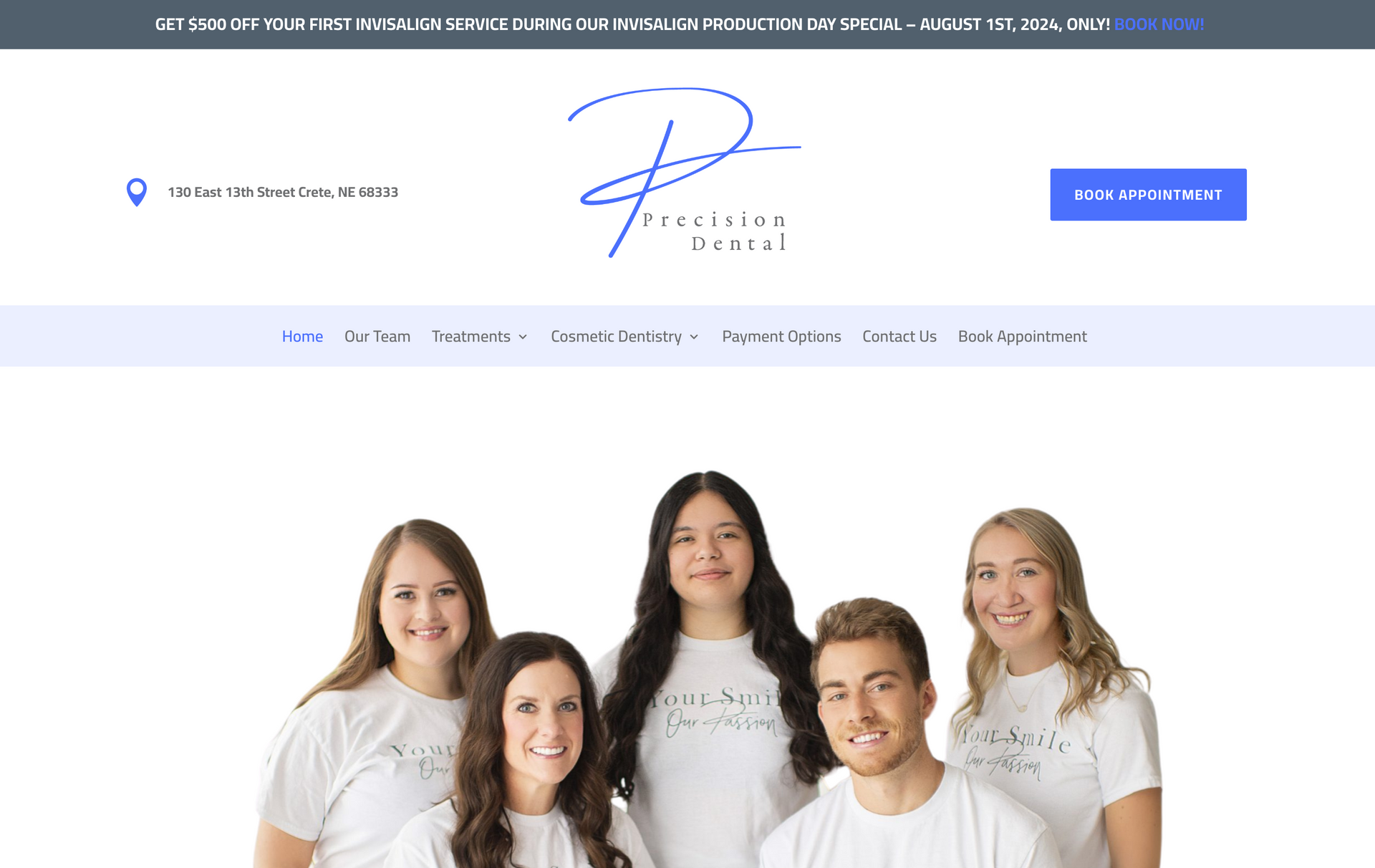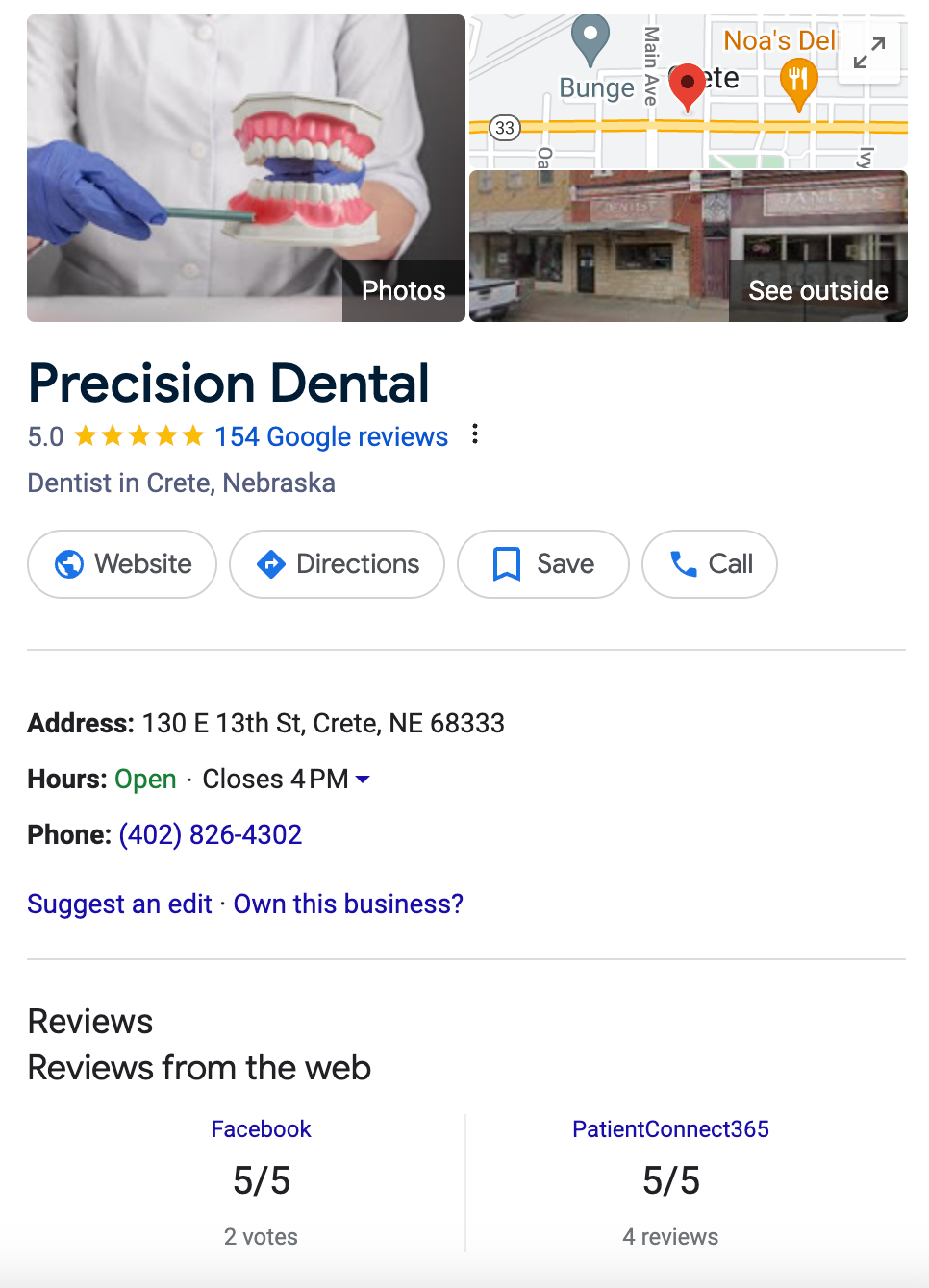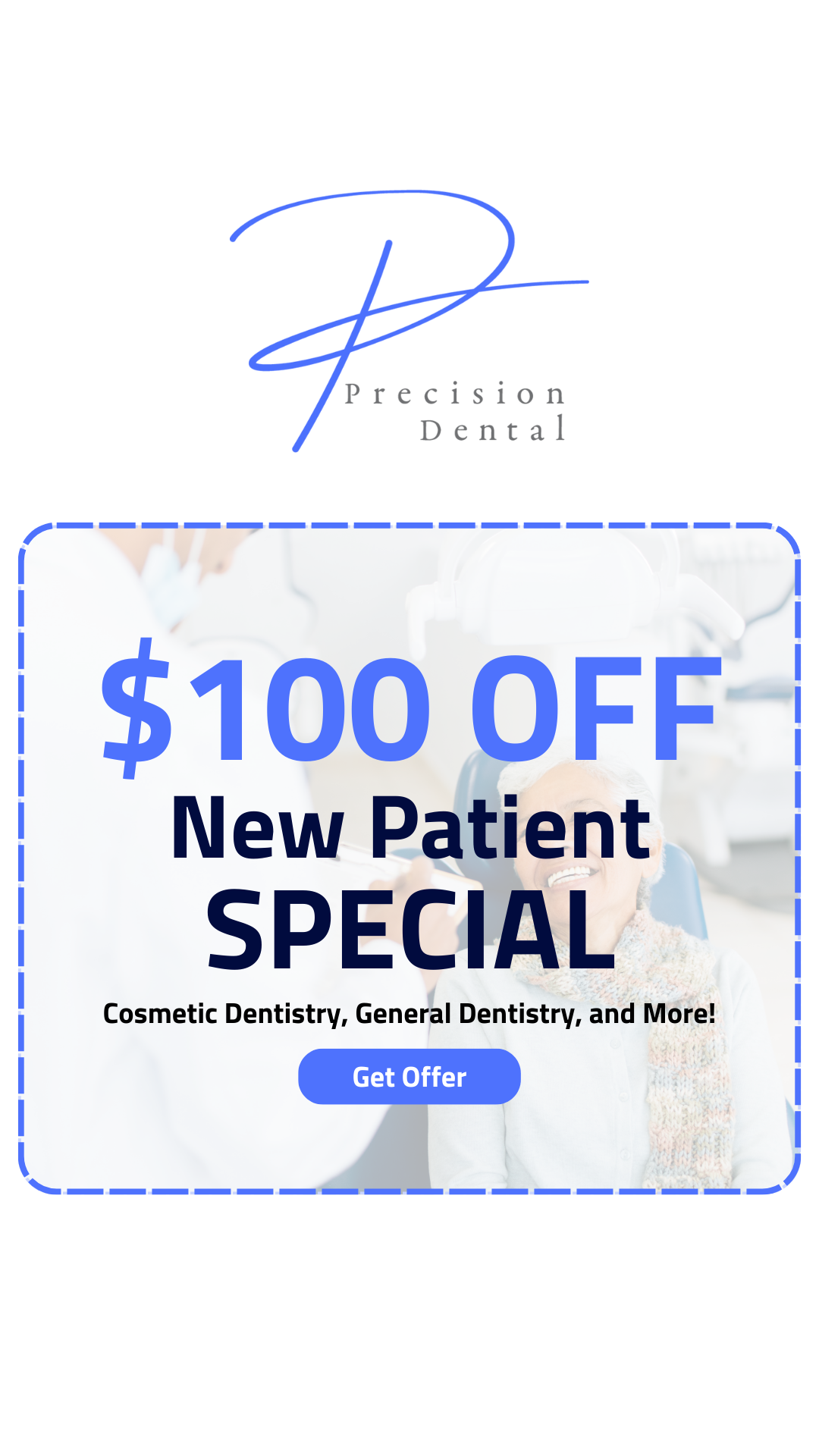Medical Practice Marketing Strategies: The 10 Best Strategies for 2025
As healthcare continues to evolve with technology, effective marketing becomes crucial for medical practices to thrive. The strategies outlined below are designed to help healthcare organizations enhance their visibility, attract new patients, and provide superior patient engagement using the latest digital marketing tools and tactics for 2025.
We'll Get You Multiple New Patients within 30-Days, GUARANTEED!
Medical Blog Guarantee Form
10. Create a Professional, Informational Website for Your Practice
A professional website serves as the foundation of any digital marketing strategy. It's the first impression potential patients get of your practice. A user-friendly, informative website can significantly influence a visitor's decision to choose your services. According to a PatientPop survey, 68% of patients consider a practice’s online presence before making a decision, which highlights the need for a well-maintained and engaging website (PatientPop).
Ensure your website is equipped with responsive design, fast load times, and updated, informative content that reflects your medical practice's expertise and professionalism. This not only helps in retaining the interest of potential patients but also assists in improving SEO rankings, making your practice more visible on search engines. Clear navigation and strong calls to action should guide visitors effortlessly to book appointments or contact your office, enhancing user experience and boosting patient intake.

9. Optimize Your Medical Office's Website for Local SEO
Before diving into the specifics of SEO audits and why SEO is crucial for your medical website, it's important to understand the overall impact of search engine optimization. Optimizing your website enhances its visibility in search results, making it easier for potential patients to find your practice online. By focusing on local SEO, you ensure that your practice appears prominently when people in your area search for healthcare services, which is vital for attracting local patients and establishing your practice as a key healthcare provider in your community.
How to Check Your Medical Practice Website for SEO
Effective SEO strategies start with a comprehensive review of your current website’s performance. Tools like Google Analytics and SEMrush are invaluable for understanding how well your site is optimized for search engines, providing insights into areas such as keyword performance and user engagement. Regularly checking these metrics helps ensure your site remains aligned with best practices for SEO, which can significantly impact your site's visibility and patient acquisition efforts.
Why You Should Optimize Your Medical Website for SEO
Optimizing your website for SEO is crucial because it ensures your site appears at the top of search engine results when potential patients are looking for medical services in your area. According to Google, 77% of health inquiries start on search engines, and sites that appear on the first page of Google receive 95% of web traffic (Think with Google). Implementing strong SEO practices such as using relevant keywords, optimizing meta tags, and ensuring your site is mobile-friendly can drive significant traffic to your site, increasing online visibility and patient bookings.
8. Prioritize Your Medical Practice Local Listings
Local listings play a crucial role in how easily potential patients can discover your medical practice online. Before we explore how to optimize specific platforms like GBP, Yelp, and Bing, let’s discuss the overall importance of these listings. They not only boost your SEO but also improve your online presence by providing consistent and accurate information across all platforms, which helps build trust and credibility with potential patients.

Top Local Listings for Medical Practices
Effective local listings ensure that your practice is easily discoverable where potential patients are searching most often. Key platforms for medical practices include:
1. Google Business Profile
Google Business Profile (GBP) is a vital tool for local SEO, helping patients find your practice easily when they search for medical services in your area. Optimizing your GBP enhances how your practice appears in search results and on maps, improving your overall online presence.
How to Optimize Your Google Business Profile
Optimizing your Google Business Profile involves several key actions: ensuring your information is accurate and comprehensive, regularly updating your profile with new posts and photos, and actively managing and responding to patient reviews. These steps help improve your profile’s visibility and search ranking, making your practice more accessible to potential patients.
2. Yelp Local Listings
Yelp is another crucial platform for local online presence, widely used by potential patients to find and evaluate medical services. An optimized Yelp profile can significantly influence a prospective patient's decision to choose your practice over others.
How to Optimize Your Yelp Profile
To optimize your Yelp listing, it’s important to maintain accurate and detailed information about your practice, encourage reviews from satisfied patients, and actively respond to all feedback. This not only enhances your reputation but also positively affects your SEO, driving more traffic to your website.
3. Bing Local Listings
While not as widely used as Google, Bing still holds a significant portion of the search engine market, and its listings help capture a different segment of the internet-using population, potentially increasing your practice’s reach.
How to Optimize Your Bing Local Listing
Optimizing your Bing listing involves ensuring that your practice's information matches that on other platforms, particularly your Google Business Profile, to maintain consistency. Regular updates and the use of high-quality images can also enhance your visibility on Bing.
4. Industry-Specific Medical Online Directories
Industry-specific directories are highly targeted platforms where patients often look for specialized medical services. Being listed on these can direct more qualified leads to your practice. You can find these listings by searching "[your specialty] near me" and clicking on some of the top directories.
7. Form Strategic Partnerships with Other Local Businesses
Forming strategic partnerships with other local businesses can open up new avenues for marketing and patient referrals. Collaborations with gyms, wellness centers, and local pharmacies can allow you to reach a broader audience that complements your own patient base. For example, a partnership with a local gym might include mutual referrals or joint health workshops, which can enhance both businesses' visibility and credibility within the community.
Such partnerships not only increase your practice’s exposure but also build community ties that can lead to long-term patient loyalty and trust. Engaging in community health events or wellness fairs as part of a local business network can also significantly boost your practice's profile and demonstrate your commitment to community health, a significant draw for many patients

6. Create a Referral Program for Your Medical Practice
Implementing a patient referral program can be an effective way to leverage your existing patient base to attract new patients. Offering incentives for referrals such as discounts on future visits or small gifts can motivate your current patients to recommend your practice to friends and family. According to Software Advice, nearly 70% of patients are more likely to choose a new doctor if they come recommended by a friend or family member, making referral programs a potent tool for patient acquisition (Software Advice).
When setting up a referral program, it’s crucial to make the process as easy as possible for patients to participate. This might include providing referral cards that they can give to friends or a simple online form they can fill out. Clear communication about how the referral program works and the benefits to both the referrer and the referred can enhance participation rates and ensure the program’s success.
5. Run Targeted Meta Ads (Facebook & Instagram Ads)
Meta platforms like Facebook and Instagram offer powerful targeting tools that allow you to reach potential patients based on detailed demographic, geographic, and behavioral data. With billions of users, these platforms provide a vast audience for your ads. Running targeted ads can increase awareness of your medical practice and attract new patients efficiently and cost-effectively. According to Statista, Meta platforms retain a high engagement rate with users, making them ideal for reaching a diverse audience (Statista).
When creating Meta ads, focus on crafting messages that resonate with your target audience. Include compelling visuals and clear calls to action, such as “Book Now” or “Learn More,” to encourage potential patients to engage with your practice. Tailoring your ads based on the specific health interests and needs of different audience segments can also improve the effectiveness of your campaigns, ensuring that your marketing efforts lead to actual patient engagements.
4. Employ Meta Retargeting Ads
Meta retargeting ads are essential for converting website visitors who have not yet made an appointment. By targeting individuals who have previously engaged with your site or social media profiles, retargeting ads keep your practice top-of-mind and encourage a return visit. This method is known for its effectiveness, with retargeted visitors 70% more likely to convert on your website compared to first-time visitors (Criteo).
Use Meta’s retargeting tools to show ads to users based on specific actions they’ve taken on your site, such as visiting a contact page or spending time on a blog post about a particular medical service. This personalized approach can significantly increase the likelihood of these individuals taking the next step to book an appointment, thereby boosting your conversion rates and maximizing the ROI of your digital ad spend.
3. Pair A Special New Patient Promotion with Your Meta Ads
Special promotions for new patients are a powerful tool for attracting interest and converting leads when paired with Meta ads. In the following sections, we’ll discuss various promotional ideas, how to effectively run these promotions, and measure their success. It’s essential to tailor these promotions to meet the needs and interests of your target audience, ensuring they resonate well and result in a higher rate of patient acquisition.

New Patient Promotion Ideas for Medical Practices
Special promotions for new patients, such as discounted initial consultations or bundled check-up packages, can be highly effective in attracting new patients to your practice. Offering a tangible incentive can make the decision easier for potential patients who are considering multiple providers. Tailoring these offers to the needs and interests of your target audience can significantly enhance the appeal of your promotions.
How to Run a New Patient Special Promotion
To effectively run a new patient promotion, clearly define the terms and make the offer compelling. Use attractive visuals and persuasive copy in your ads to highlight the benefits of the promotion. Ensure that the promotional details are clear and that the process for redeeming the offer is straightforward, such as a simple online form or a promo code that can be used when booking an appointment online.
How to Make Sure Your New Patient Promotion Actually Works
Monitoring and analyzing the performance of your promotion in real-time allows you to make necessary adjustments to maximize effectiveness. Track metrics such as engagement, click-through rates, and conversion rates to assess the impact of your promotion. This data can help you understand what’s working and what’s not, allowing you to optimize future promotions for better results.
How to Track Your New Patient Promotion
Use tracking tools available through Meta Ads Manager to monitor how your promotions are performing. Setting up conversion tracking can help you measure specific actions taken as a result of your ads, such as signing up for a promotion or scheduling an appointment. This insight is invaluable for understanding the effectiveness of your advertising spend and for making data-driven decisions to improve future campaigns.
Additional Tips to Running a Successful New Patient Promotion
In addition to tracking and optimization, consider integrating your promotion across multiple channels for maximum exposure. For example, mention your promotion during in-office visits or in your practice’s newsletter to ensure existing patients are aware and can share the promotion within their network. Also, provide exceptional service to first-time patients coming in through these promotions to encourage retention and positive reviews, which can further enhance your practice’s reputation and attractiveness to new patients.

2. Utilize Google's Performance Max Campaign to Promote Your Practice Location
Google's Performance Max Campaign offers a comprehensive approach to promoting your practice location. By integrating various Google advertising channels, including YouTube, Google Search, and the Google Display Network, this type of campaign maximizes visibility and engagement. According to Google, Performance Max campaigns can increase conversion rates by up to 30% by leveraging machine learning to optimize ad placement and targeting (Google).
This AI-driven strategy allows for precise targeting based on user behavior and preferences, ensuring that your ads are seen by potential patients who are most likely to need your services. By using Performance Max campaigns, you can streamline your advertising efforts, making it easier to manage and more effective at driving results.
1. Run High-Intent New Patient Google Search Ads
High-intent Google Search Ads target individuals who are actively seeking medical services, placing your practice’s ads at the forefront when potential patients are in need. By focusing on keywords that indicate strong intent to find medical services, such as “emergency dentist near me” or “best dermatologist in [city],” you can attract patients who are ready to book an appointment. Targeting these high-intent searches is incredibly effective, with a study from Google showing that such targeted ads can lead to a 50% increase in click-through rates (Google).
The specificity of Google Search Ads ensures that your advertising budget is spent on reaching those who are most likely to convert, making it one of the most cost-effective marketing strategies for medical practices. By carefully selecting keywords and crafting compelling ad copy, you can significantly increase your practice's online visibility and attract more new patients.
Recap
The strategies discussed provide a robust framework for any medical practice looking to enhance its marketing efforts in 2025. From optimizing your online presence to employing advanced advertising techniques, these strategies focus on leveraging digital tools to increase visibility, engage potential patients, and grow your practice.
Work with An Expert Healthcare Marketing Agency
To maximize the effectiveness of these strategies, consider partnering with an expert healthcare marketing agency. Murray Marketing Services specializes in helping healthcare organizations navigate the complex digital landscape with customized marketing solutions designed to attract and retain patients.
By collaborating with a professional team, you can ensure that your marketing efforts are not only current but also strategically aligned with the latest industry trends and best practices, allowing you to focus more on providing top-quality patient care.
About the Author:
Nathan Murray, Founder, Murray Marketing Services
Murray Marketing Services is a client-first digital marketing agency providing services in website design, Google advertising, video production, local SEO, graphic design, and social media marketing. Recently, we were voted 2023's Best IT Services and Best Video Services Company by readers of the Kearney Hub.
As an extension of your team, our mission is to grow your business. We work with your team to pair the goals of your business with data-backed digital marketing strategies. Since launching in 2021, we've had the privilege of working with over 50 businesses across the United States.









